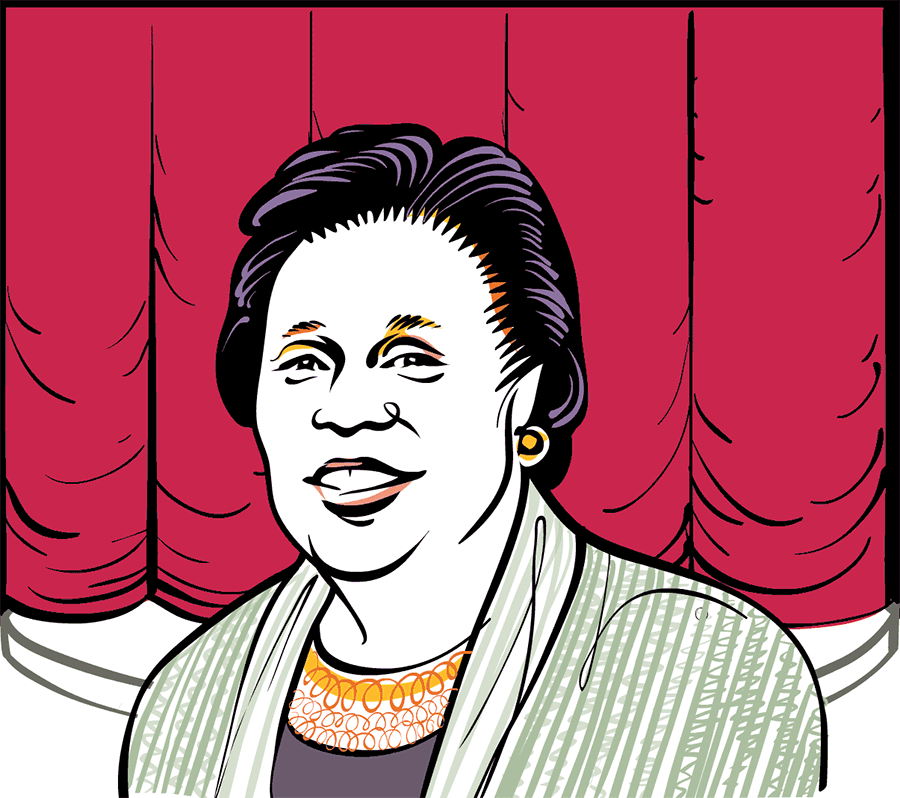
When I was a little girl — I couldn’t have been more than 2 or 3 — I would make up stories. It kind of upset my family, because I’d go into the closet and start acting them out. They didn’t say it was bad or look at me weird. They just said, “We know you’re special, but you can’t do that in front of other people ’cause they won’t understand.”
My mother had me seven years after having what she thought was her last child. There were seven of us. Because she was dark-skinned and not accepted by her family, she had suffered a lot by the time I came along. I think she was just tired, so she wasn’t as affectionate or loving. She saw the world in a very negative way.
We moved to Cabrini-Green in ’57 or ’58. When you stack people on top of each other who are all impoverished, you’re creating a foundation for violence that perpetuates itself. You had to kick ass or get your ass kicked. But that wasn’t going to happen to me. “Don’t mess with Jackie and her brother Joe,” people would say. “They’re nuts.”
My mother would always say, “Just because you live in the projects doesn’t make you a project person. Don’t come in here with that project mentality.”
When I was a senior in high school, a girl came up to me with a group of friends and said, “Are you Jackie Taylor?” And I said, “Yeah.” And she said, “I heard you the baddest bitch in this school.” I went, pow! And she just tumbled to the ground. Woo, I got such satisfaction out of that. She shouldn’t have gone there with me. But I looked down and felt so sorry for her that I thought, This is gonna be my last fight, ’cause this is stupid. And that was it.
I never thought Chicago was second to New York, culturally. I did a couple of plays in New York and I never liked the environment. I didn’t like the attitude toward African Americans. I thought they were 25, 30 years behind Chicago, and I thought their theater stank. Even though they were interested in me, they wanted to change my work. They wanted to take the blackness out of it and make it more palatable to their audiences. It was the black exploitation era, and they were glorifying cocaine and drugs as what we did in the black community. I said, “Y’all writing about some shit you don’t know. This is a tiny aspect of who we are and our culture.” They laughed and said, “We’re interested in one thing, and that’s making money. You’re not a civil rights activist, you’re an actress. So keep your mouth closed and act.” And I said, “Fuck. You.”
I was in the bathtub when I thought of the name Black Ensemble Theater, after the Negro Ensemble Company in New York. Its mission would be to eradicate racism. I was married at the time, and my husband said, “Are you crazy? Most people don’t even know what ‘eradicate’ means.” I had to get out of that relationship. I can’t travel with a partner who can’t see what I’m trying to do.
You can have a vision, but if you don’t know how to perpetuate and market it, and you aren’t strong enough to handle the slings and arrows that come your way, then a vision is all it’ll be.
If I owe you money, you’re going to get paid eventually. It might not be when you want it, it might not be how you want it, but you’re going to get paid.
I’m a workaholic. I get up and I work until I go to bed. I had to learn to take time for myself. I did not always take vacations. Somebody came into my life and said, “You’re way off balance. You can’t keep going like this.” That really hit me.
I was 22 when I said, OK, I better stop blaming my mother; stop whining and get over it. If you’re still using excuses after you’re grown, there’s something wrong with you. Blame helps nothing.
There are always lessons to be learned from looking back. But I’m not gonna live in the past. I’m not gonna beat myself up. I’m too wonderful for that.


